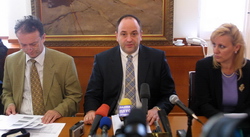- Serbia
Get to know Serbia
- Citizens
Culture and science
Health services
Pension and disability insurance
- Business
Employment
Economy
- Media
- Government
- Contact
Keep in touch
Contact form
Back
Keepin touch
Whether you have a question, comment, suggestion or any problem in the purview of the government, send us your message and we will try to respond as soon as possible. If your problem is not in our purview, we will forward your message to the relevant institution.
Q:
A:
Negotiations on Serbia’s accession to WTO from June 7 to 9 in Geneva
Belgrade,
1 June 2006
Serbian Minister of International Economic Relations said today that the process of Serbia’s accession to the World Trade Organisation (WTO) is continuing regardless of the halt in negotiations on joining the European Union.
Speaking at a press conference, organised prior to the second round of negotiations with the WTO, which will be held from June 7 to 9 in Geneva, Parivodic said that WTO membership does not depend on the political situation and Serbia’s accession to the WTO is not connected to negotiations with the EU.
He said that in the continuation of negotiations, Serbia’s progress in the process of accession to the WTO will be assessed, and main themes of the meeting will be the external trade regime, the status of customs tariffs for industrial goods and agricultural products, and subsidies for agricultural production.
Assistant Minister for multilateral and regional trade cooperation Dusko Lopandic said that negotiations with the WTO should last a further two to three years, and the process will not be influenced by the breakup of the state union.
According to Lopandic, in the area of legislation Serbia has already harmonised all the necessary regulations, and the particularly important Law on external trade affairs has been adopted, which outlines all antidumping measures and excessive import protection measures.
Commenting on Bosnia-Herzegovina’s decision to abolish the customs-free regime for the import of specific products from Serbia, Parivodic said that such a decision is illegitimate and could lead to disruption in the entire liberal trade system between the two countries.
He called upon authorities in Bosnia-Herzegovina to examine the decision once again, and said that he will hold serious talks on this problem with representatives of the EU, the Stability Pact for South East Europe, and the Central European Free Trade Agreement (CEFTA).
Parivodic said that Bosnia-Herzegovina is the only country which is violating the agreement on free trade with Serbia, and added that Serbia is not considering bringing a similar decision concerning products from Bosnia-Herzegovina.
He said that he hopes that the CEFTA will carefully monitor the implementation of the agreement on free trade and, if necessary, exert a milder form of force in the case of Bosnia-Herzegovina.
He stressed that losses resulting from Bosnia and Herzegovina’s decision to abolish the customs-free regime for import of certain food products from Serbia still have not been calculated.
He said that in the continuation of negotiations, Serbia’s progress in the process of accession to the WTO will be assessed, and main themes of the meeting will be the external trade regime, the status of customs tariffs for industrial goods and agricultural products, and subsidies for agricultural production.
Assistant Minister for multilateral and regional trade cooperation Dusko Lopandic said that negotiations with the WTO should last a further two to three years, and the process will not be influenced by the breakup of the state union.
According to Lopandic, in the area of legislation Serbia has already harmonised all the necessary regulations, and the particularly important Law on external trade affairs has been adopted, which outlines all antidumping measures and excessive import protection measures.
Commenting on Bosnia-Herzegovina’s decision to abolish the customs-free regime for the import of specific products from Serbia, Parivodic said that such a decision is illegitimate and could lead to disruption in the entire liberal trade system between the two countries.
He called upon authorities in Bosnia-Herzegovina to examine the decision once again, and said that he will hold serious talks on this problem with representatives of the EU, the Stability Pact for South East Europe, and the Central European Free Trade Agreement (CEFTA).
Parivodic said that Bosnia-Herzegovina is the only country which is violating the agreement on free trade with Serbia, and added that Serbia is not considering bringing a similar decision concerning products from Bosnia-Herzegovina.
He said that he hopes that the CEFTA will carefully monitor the implementation of the agreement on free trade and, if necessary, exert a milder form of force in the case of Bosnia-Herzegovina.
He stressed that losses resulting from Bosnia and Herzegovina’s decision to abolish the customs-free regime for import of certain food products from Serbia still have not been calculated.
-
 Belgrade, 26 November 2025
Belgrade, 26 November 2025Serbia-Hungary partnership best example of European cooperation
-
 Belgrade, 22 January 2025
Belgrade, 22 January 2025Egypt one of Serbia’s closest partners on international stage
-
 Belgrade, 9 July 2024
Belgrade, 9 July 2024Support for 104 associations in diaspora that preserve Serbian language, culture
-
 Belgrade, 15 April 2024
Belgrade, 15 April 2024Competition for StarTech grants open until 31 May
-
 Belgrade, 2 October 2023
Belgrade, 2 October 2023Serbia respects Resolution 1244 and will do everything to preserve peace
-
 Belgrade, 13 September 2023
Belgrade, 13 September 2023Day of Serbian Unity to be celebrated outside borders of Serbia, Republika Srpska for the first time
-
 Belgrade, 8 August 2023
Belgrade, 8 August 2023RSD 24.2m in state aid paid out to citizens affected by storm
-
 Belgrade, 17 June 2023
Belgrade, 17 June 2023Belgrade is doing everything to preserve peace in Kosovo and Metohija
-
 Belgrade, 15 June 2023
Belgrade, 15 June 2023Slovenia will continue to support Serbia on its way to EU
-
 Belgrade, 5 May 2023
Belgrade, 5 May 2023Emergency measures, tightening of conditions for possessing weapons


